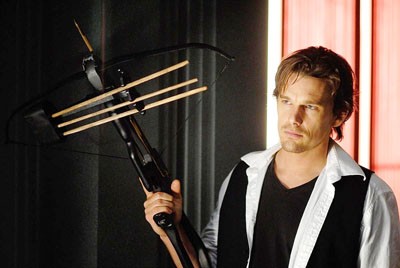
My expectations for this film were low. Perhaps too low, because Daybreakers did something I have not seen for quite some time in the vampire film continuum: While adhering to formal rules for the vampire archetype (i.e. no sparkles, no magic rings to walk in the daylight), the storyline actually adds something new to vampire mythology as a whole.
The gist of the adventure is as follows: In a post-outbreak world, the vampire plague has transformed too many humans, leaving sustenance in disturbingly short supply. While a rigid corporate structure is governing the capture and imprisonment of remaining humans for exhaustive use in blood farms, scientists like Edward Dalton (Ethan Hawke) are struggling to find a blood substitute that doesn't turn vampires into goo. This is imperative because, unlike the irreducibly handsome vampires of The Vampire Diaries and Twilight, who can conveniently maintain their sanity and good looks without drinking human blood, Daybreakers's vampires draw on the ravaged spectre of Nosferatu (the 1922 version suffices, but Herzog's 1979 enhancement is just mindblowing) to suggest a world where failure to feed causes vampires to gnaw on their own flesh and blood until they manifest as hideous sub-vampires. (This becomes especially key to the theme of "othering," which this film also develops to a sufficiently unexpected level for a conventional action flick.)
Now, in the pursuit of this cure Edward's intentions are ultimately altruistic: having been turned into a vampire against his will by a brother who far prefers the condition to life as a human, Edward hopes to save the human race from extinction, and offer it freedom from vampire predation. Meanwhile, Charles Bromley (Sam Neill) has a different end in mind: namely, cornering a whole new market for financial gain, while allowing the human race to repopulate just enough to keep a high-end commercial market for real blood afloat as well. Blood-suckers, business men -- the line is quickly blurred in this film despite efforts to humanize Charles through a side-plot about his human daughter.
But here comes the catch. Willem Dafoe, looking a bit like something fresh from the horrors of Eden, enters the scene as Lionel "Elvis" Cormac, a member of a small human resistance group. Elvis comes with a curious personal CV: He was a vampire for nine years, but his heart beats like a human's once again. In this way, Elvis is living proof that a cure to the plague exists, and with Edward's help he hopes to test this cure with full scientific rigour, then spread word of its existence across the starving, mutating vampire lands.
Being a conventional action flick, the usual plot twists and turns, the betrayals, the love interest, the convenient timings emerge throughout its whole. Sacrifices are made, and lives unjustly lost, in precisely the sequence one would expect. The CGI is also not sensational, the fight scenes a little tedious, the characters all teetering a little on 2-D, and if you ask me, the very post-production colour palate is verging on cliche.
But the cure in question is to the best of my knowledge unique in the vampire film continuum, and effective. And the way this film approaches "othering" -- of humans by vampires, then sub-vampires by vampires -- is also effective. For these reasons, while no Let the Right One In, or even mainstream hit Interview with a Vampire, Daybreakers clearly punches above the average success rate for vampire films as a whole. So if vampires are your thing, and you're all caught up with True Blood or whatever other vampire series are currently airing, you could do far, far worse than consider Daybreakers for your next evening in.
No comments:
Post a Comment